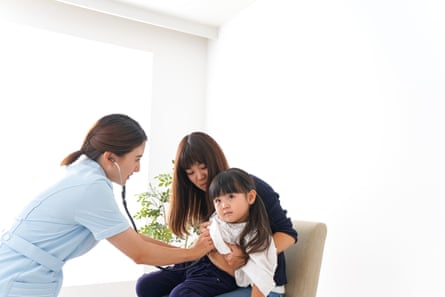Avoid flat lemonade and don’t starve the bug: what to do when gastro strikes
Experts share their tips for treating viral gastroenteritis at home – and when it’s important to see a doctor

As anyone caught up in the surge of cases of viral gastroenteritis in New South Wales will know, the illness is highly infectious. Gastroenteritis, or gastro, involves inflammation of the stomach and intestinal lining, and symptoms include nausea, vomiting, stomach cramps and diarrhoea.
It’s mostly spread by symptomatic people when virus from their faeces or vomit hitches a ride on their hands, objects, food or drinks. But people can pass it on before symptoms develop or without suffering symptoms themselves.
There are many causes – including viruses, bacteria and parasites – but the most prevalent are rotavirus in children and norovirus in adults.
While most people recover in a few days, the illness can be more serious for infants, elderly people and those who are immunocompromised.
So how can you best protect yourself and others? And if you or someone in your household has contracted gastro, what is the best way to treat the illness?
Immunise children against rotavirus

For children, immunisation against rotavirus – which is free under the National Immunisation Program Schedule – is the best way to protect children from severe illness.
Dr George Alex, the director of gastroenterology at the Royal Children’s hospital in Melbourne, says: “In Australia it’s part of the immunisation protocol at two and four months of age – the first dose must be given by 14 weeks and the second dose by 24 weeks of age.”
But vaccinated children can still fall prey to gastro, whether from rotavirus or other causes.
“That’s because neither natural infection with rotavirus nor vaccination provides full protection from future infections, but [vaccination] decreases the severity of the disease significantly,” Alex says.
Drink plenty of fluids, try to eat and avoid flat lemonade

“In most cases [of gastro], the body will fight off the infection and recover on its own. The mainstay of treatment is to ensure plenty of fluids are drunk to prevent dehydration,” says Dr Santosh Sanagapalli, a gastroenterologist at St Vincent’s hospital in Sydney.
“For older children and adults, plenty of liquid should be drunk – ideally commercially prepared oral rehydration solutions, available from the chemist.
“In breastfed infants, short and frequent breastfeeding should continue but sometimes supplemental fluids are required.”
Children who don’t tolerate rehydration solutions can be given juice diluted with water.
But ignore advice to drink flat lemonade, as experts warn sugary drinks can exacerbate diarrhoea.
If you’re nauseous, small amounts of food are recommended and start with bland food such as toast, crackers or rice when your appetite returns.
That holds for children too, says Dr Nikhil Thapar, the director of gastroenterology at the Queensland Children’s hospital.
“In the old days, the mantra was kind of ‘starve the bugs’,” he says. “And then of course, we realised a lot of these kids took longer to recover. So in most cases of mild, even moderate gastroenteritis, it’s often that continuing to provide them with nutrition and ensuring they have a good amount of fluid … are really important for the recovery.”
Prescribed medication might help
Dr Michael Clements, a Townsville-based GP and chair of the Royal Australian College of General Practitioners’ rural arm, says doctors can prescribe medication to help with nausea and “if vomiting is a major issue”.
“In terms of vomiting, we used to talk about letting nature run its course but now we’re a lot more comfortable in using a particular drug called ondansetron, which you need a prescription for, and is safe in children and adults,” he says.
Clements says the drug, which comes as a wafer that dissolves in the mouth, may be helpful for those who can’t keep medicines down.
But he emphasises that anyone on important medications should seek medical advice early in their illness.
READ RELATED: My parents failed to guide me through my education. Do I confront them? | Ask Annalisa Barbieri
“You might not absorb some of your medications while you’ve got nausea and diarrhoea, so they may not be as effective – that includes painkillers as well as contraceptive pills,” Clements says.
If telehealth isn’t appropriate, general practices have policies around seeing infectious patients face-to-face, which might include waiting in the car until being assessed.
The Gastroenterological Society of Australia advises against giving over-the-counter medicines to reduce vomiting and diarrhoea to children as they may stop the gut functioning naturally.
Wash your hands with soap (not sanitiser) and stay at home

Face masks won’t offer much protection against gastro. Alex says the illness is spread by ingestion rather than inhalation and unless a patient is “vomiting profusely”, in general, mask wearing may not be helpful.
Clements recommends giving any afflicted household members their own bathroom, towels and sink, if possible, and keeping them away from food preparation or dining areas.
He also emphasises the importance of washing hands thoroughly with soap and water, since alcohol-based hand sanitisers aren’t effective at killing the viruses that cause gastro.
“When these things are going around, one of the best things we can do is just to keep people home – don’t send kids to daycare or school or go work,” Clements says.
It’s recommended that you wait 24 to 48 hours after symptoms pass before resuming normal activities.
When to seek medical advice

Dehydration is a risk for anyone with gastro, though older people are more susceptible – particularly if they have other risk factors such as poor kidney function or take certain medications.
Signs of dehydration include being dizzy or lightheaded, headache, dark urine and dry mouth.
People who can’t keep any fluids down are advised to see a doctor, as they may need an intravenous drip.
Other signs you should see a doctor include: blood or mucus in bowel movements, green vomit, high fever, severe abdominal pain or symptoms persisting beyond seven days.
“If there is blood or mucus in the stool, the cause is more likely to be bacterial. Severe abdominal pain may also point more towards a bacterial cause,” Sanagapalli says. Antibiotics are prescribed for some severe cases of bacterial gastroenteritis.
Anyone recently returned from overseas, along with babies under six months old, should also be checked by a doctor if they have vomiting and diarrhoea.
Children and babies are also more susceptible to dehydration.
“If they’re not drinking and just vomiting, they’re not passing much urine, not getting wet nappies, if they start to get drowsy, if when they cry they have no tears – that might prompt [seeing a doctor],” Thapar says.
“If children have quite significant [pre-existing] illnesses or are on immunosuppression treatments, most specialist units would have given them emergency treatment plans, but often just touching base with healthcare providers is useful if you’re concerned.”
Are there long-term effects of gastro?
Sanagapalli says while rare, a small number of gastro patients develop post-infectious irritable bowel syndrome, where milder gut symptoms linger for weeks or even years.
“If this occurs, see your GP or gastroenterologist, as you may need further evaluation or specific therapy,” he says.
But all four experts agree there isn’t enough evidence to support taking probiotics during or after a case of gastro.
The exception is diarrhoea caused by antibiotics, Thapar says.
“Certainly for things like antibiotic-induced diarrhoea, then there is evidence around the use of probiotics to try and limit that. That’s really when the antibiotics have killed off a lot of your own bugs and having a probiotic helps to repopulate the gut.”
Source: Health & wellbeing | The Guardian







